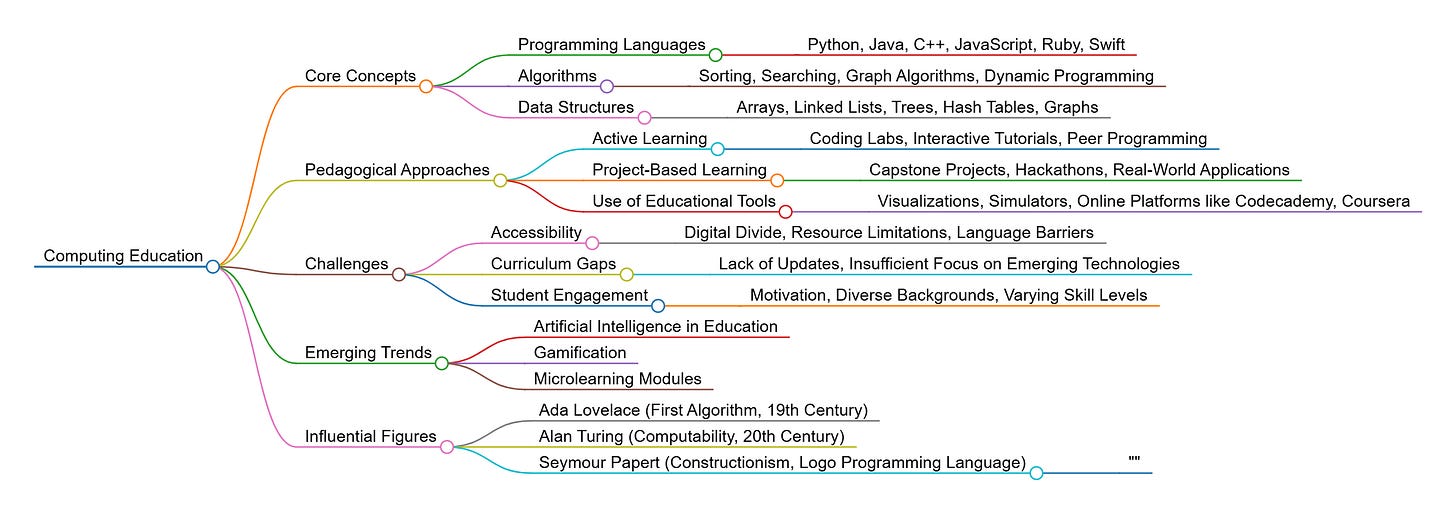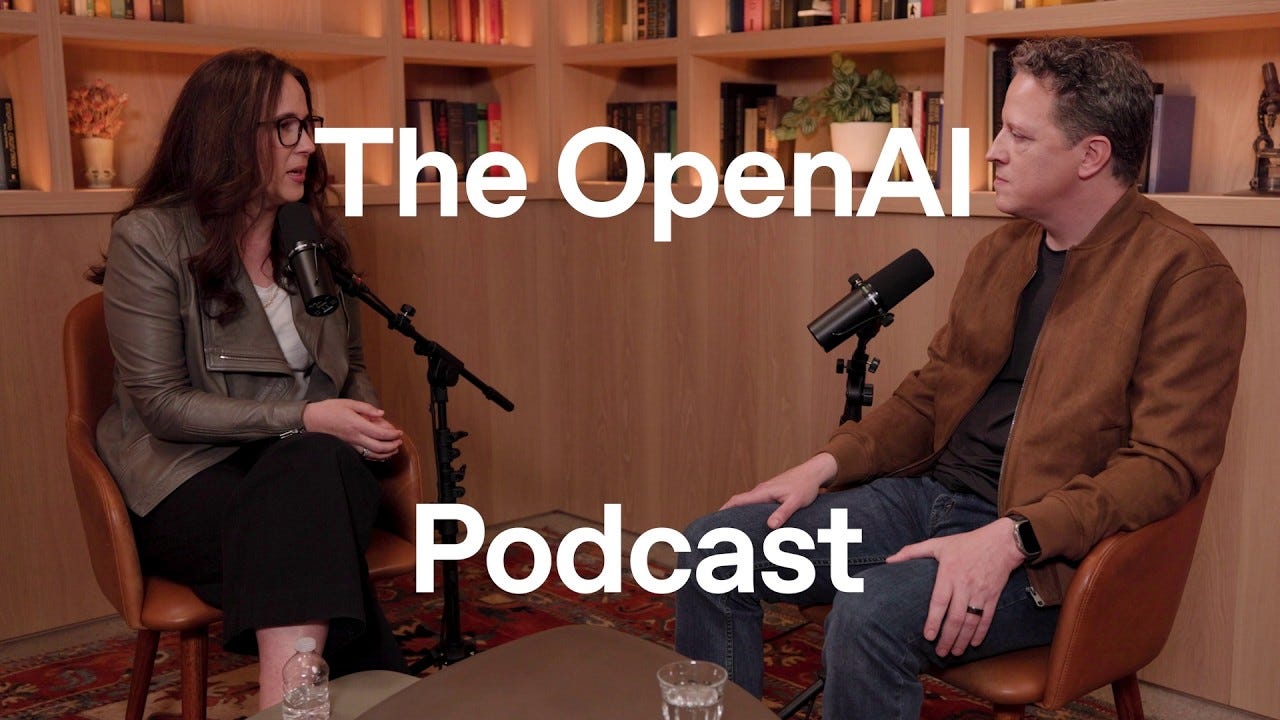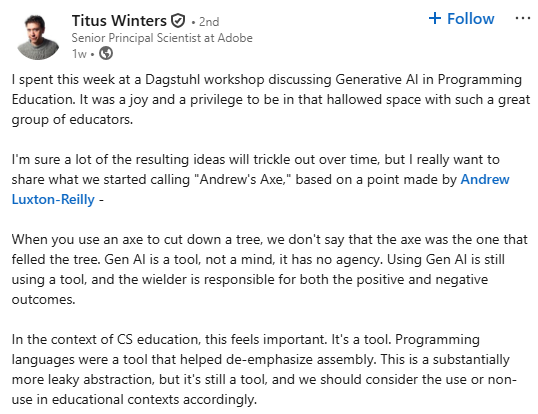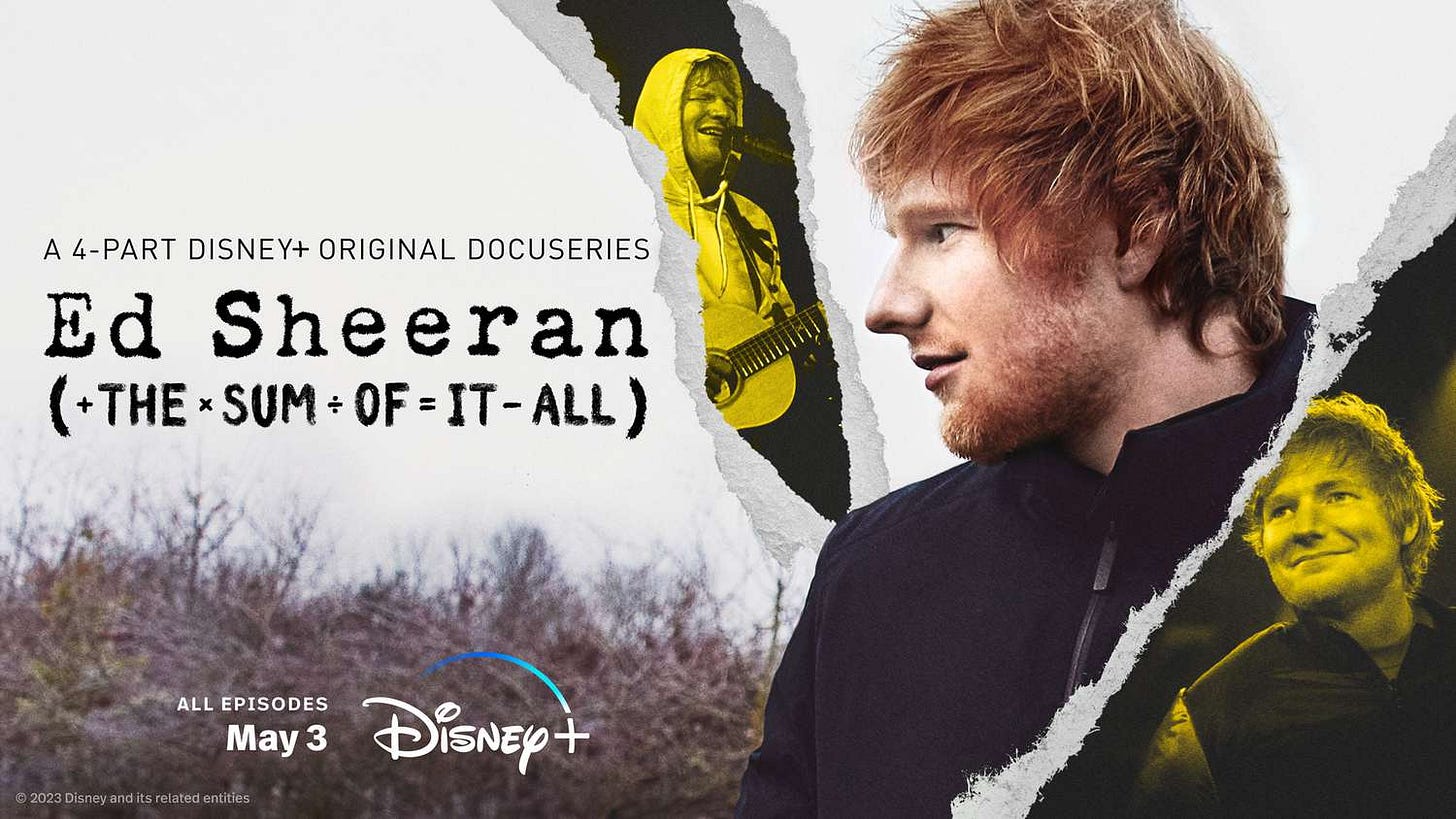#9 — CS integration in other subjects
AI is making CS essential but we should be more intentional
I'm writing for the first time from the 93-degree summer heat in Houston, Texas. It's been a week full of emotions and also a necessary time of adaptation. This is surely the most complete and content-filled post to date (especially on the teaching side), not only because of the excitement of starting a new chapter in my life but also because there wasn't one last week and I have accumulated a lot of stuff. Now, let's move on to this week's edition.
Insights from KIRUPA's Vibe Coding
I love this approach to vibe coding from KIRUPA:
Let me do a summary for you:
They remove a lot of the boringness and struggle that used to be a part of writing code.
We focus on the cool and fun parts instead.
LLMs do a great job turning vague prompts into working code. That’s the good news. The bad news is about the quality of the generated code itself.
For the coding scenarios that you are very familiar with, there is a good chance that the AI-generated code won’t meet your bar as well.
The interesting thing is that the AI assistants do know how to generate high-quality code. They just need you and I to either prompt them with more details up front or revise the output with a more detailed follow-up prompt.
The more you and I know about the underlying details of what code the AI is generating, the better we will be at vibe coding something that is high quality.
AI assistants still require us to play the role of code reviewer. We need to go line-by-line and ensure that our standards are being met, just like how we may treat a pull request or change from another human being.
Now, as the models keep improving in quality, there will be a future where we may no longer need to be domain experts around the generated code. The default output from AI assistants will automatically incorporate best practices, address edge cases, and make the sorts of smart choices that will bring a tear to your eye. That day is definitely not today.
All new code will be written by an AI assistant. We will play the all-important role of reviewing the code and ensuring the output meets our standards.
🔍 Resources for Learning CS
→ Math Prerequisites for Machine Learning
These are the math prerequisite review resources for CSC311 Introduction to Machine Learning, used at University of Toronto Mississauga. These resources are intended to help review the linear algebra, calculus, and probability/statistics prerequisites used in the course. They are intended to be used "just-in-time", i.e., just before each lecture or module.
→ Mind Map Wizard creates visual and quick mind maps with AI
You just write a central idea and the tool generates an editable outline that you can export as an image or PDF. It also allows you to create maps from free text. It's free and doesn't require creating an account to use it. Here is the generated map with the word Computing Education:
Two good bites from the industry
→ A new OpenAI podcast episode on learning in the AI era
AI is redefining how we learn—from personalized tutoring to entirely new teaching models. Hear from OpenAI’s Head of Education, Leah Belsky, on what this shift means for students, educators, and society. Special guests include college students Yabsera and Alaap, who share their perspectives on learning in the AI era.
→ AI is making CS essential
Leadership at Microsoft, Google, OpenAI, Amazon, all agree. Hadi Partovi (code.org founder) longer essay explaining this.
Six CS Educators Share Tips for Integrating CS Across Subjects
In this Hello World podcast episode, they spoke to six educators at the CSTA (Computer Science Teachers Association) 2025 Annual Conference, who shared their tips on how to integrate computer science into other subjects.
Tiffany Jones (CS & Cybersecurity Teacher, Teacher of the Year): Integrate CS by using sensors, microcontrollers, databases, and programming languages to collect and analyze real-world data in science classes, such as studying ocean pollution.
JC Gordon (K-5 STEAM & Computer Science Teacher): Don’t be afraid to step outside the box by combining your existing expertise (like dance symbols) with CS concepts through unplugged activities where students program each other as robots.
Lisa Wenzel (Computer Science Teacher, Middle School): Find what you’re passionate about and collaborate with a CS teacher who can show you how to incorporate computer science into teaching coordinate planes, art colors, or other subjects.
Rebecca Muller (CS Curriculum Developer & Teacher Trainer): Make lessons more interactive by using CS as the “fun part of education” that excites students and helps them make unexpected connections while reaching students you might not have connected with before.
Rick Ballew (Middle School CS & Engineering Teacher): Take one of your favorite existing lessons and identify where computational thinking already exists in it, then explicitly call it out to students to show how CS is embedded in everything.
Vashonda (Middle School Computer Science Teacher): Keep an open mind and use resources like Hello World magazine to discover different topics that can incorporate computer science into your teaching.
21st Century Classroom Challenges
I was listening to a Spanish podcast with guest Francesc Torralba, an outstanding academic who has 4 doctorates. It's a long episode where he makes several interesting reflections on life, death, current society... but I wanted to share his response about his vision on teaching (I've done my best to translate it well into English). I hope you find it as thought-provoking as I did:
The profile has changed a lot. They come without pens, they come without paper. They all come with a personal computer. This is the reality. You walk into the classroom, you find 80 students or 70, mostly girls in communications, with their personal computers typing away. Now, where are they? You have no idea. Actually, they could be very far away. Very far. Watching a Lady Gaga concert, WhatsApping with a student doing Erasmus in Brussels, or simply, I don’t know, checking out a website or a podcast that interests them. And there you are talking about Kant’s categorical imperative.
So this is a challenge for us. Some professors take it really hard and ban the devices because they create distraction. Others force you to be much, much more convincing and much more expressive. Therefore, there’s a lot of wear and tear. I mean, you can’t just sit there on the podium giving a monologue. It forces you to walk around a lot, to interact to maintain attention. But it’s a battle. I call it the battle against distraction, which all of us professors experience. Not in high school, because now they’ve banned it. Before, the cell phones were there, right? But at the university we can’t prohibit that. A connection is generated that can last a lifetime. I mean, well, I went there without many expectations, but wow, I started getting interested and I closed my laptop and said, now I want to pay attention to this. But you have to win them over every year. What worked the previous year doesn’t work. In September you have to go down to the arena like a gladiator and start all over again.
🔍 Resources for Teaching in CS Education
→ If you teach Algorithms courses, this might interest you
Online material suitable for an Introduction to Algorithms course. Currently includes:
30 common Problems (e.g. sorting, N-Queens, etc.)
9 Algorithmic Techniques (e.g. Greedy, Divide-and-Conquer), with 2-3 example algorithms of each type
15 Algorithms (in addition to the ones presented on the techniques pages, and many more coming soon!)
51 Algorithms demos
https://cusack.hope.edu/Algorithms/
→ Full Intro AI Course on YouTube
Adam Gaweda teaches intro AI and has his lectures recorded on YouTube if you'd like to see a full list of topics and how he covers them. It's from 2023 but I think it still works.
→ An LLM Tool That Guides Students
CodeHelp is a simple tool powered by LLMs that helps students with programming and other CS questions without writing code for them. A few benefits:
Provides students access to LLMs as learning tools in a controlled way that doesn't just do the work for them.
Lets you tailor responses to your specific course context and assignments.
Always instantly accessible, helping students whenever they're working.
Very low barrier for requesting help. Instructors can see their students' queries (including CSV export) to gain insight into where students are struggling and intervene if needed.
→ Free Systems Textbook + Opportunity
Dive into Systems is a free/online textbook that serves as a gentle introduction to computer systems, computer organization and parallel computing.
BTW, they are currently recruiting exercise developers for year 4 of their project. If you are interested in being an exercise developer for their current focus (the Architecture chapter and also part of Using Unix in Appendix 2), please fill out the following form no later than Sunday, August 24th. They anticipate that selection of the exercise development team will begin at the beginning of September, with work likely starting mid-September.
→ Four Problem-Solving Tutors for Introductory Programming Courses
If you're considering resources for teaching Introductory programming, here are a series of tutors that were designed to help students learn by solving problems:
Problets - Code-tracing tutors
Epplets - Parsons puzzle tutors
Solvelets - Computational thinking tutors
Auglets - Code refactoring tutors
→ SketchWow creates visual diagrams with a hand-drawn style
Ideal for presentations, classes or videos, it works from the browser and lets you drag icons, texts and drawings to create whiteboards and diagrams. You don't need to know how to draw: everything has a handcrafted feel that helps explain ideas clearly. It's a monthly paid tool, but interestingly they offer a one-time payment deal for 49 dollars.
🌎 Computing Education Community Highlights
Katharine Childs & Nicola Looker from University of Glasgow lead a monthly online meetup for CSEd PhD students. Meetups will restart Thursday, September 18th. If you're interested in joining, email Katharine (k.childs.1@research.gla.ac.uk) or Nicola (2603392L@student.gla.ac.uk) for the Teams link.
Fully-funded 3-year PhD scholarship for researching innovative pedagogies to teach social impacts of computing using LARP (live-action roleplaying games) at the University of Trento, Italy with the CRIT lab - a small, multidisciplinary, creative team focused on reconnecting computing with social complexities through innovative education. Deadline: August 22nd.
Links:
General topic info (look for position C2)
Application form (choose "information engineering and computer science")
SIGCSE TS 2026 is still looking for volunteers to serve as reviewers. If you are interested in serving as a reviewer for TS 2026, here is the form.
Christopher Painter-Wakefield from Colorado School of Mines would like to hear from any departments that are using either Go or Rust as a teaching language, particularly in required core courses such as CS1, CS2, Algorithms, etc. If you are using either of these languages in your curriculum, drop him a line with your institution name and what core courses you are using it: cpainter@MINES.EDU.
A team of researchers from Technical University of Munich are currently exploring how online in-browser IDEs are used in teaching computer science — and more importantly, how instructors experience them in their day-to-day teaching. The insights you share in this survey will directly inform ongoing research aimed at improving teaching tools for computer science education — with a special focus on making these tools more accessible, effective, and instructor-friendly. This survey contains free-text questions where you can share your thoughts openly. There are no right or wrong answers — they're genuinely interested in your honest experiences and ideas. You can find the survey here.
🤔 Thoughts For You to Ponder…
I 100% agree with this!
Reading this made me think — maybe letting teachers build custom chatbot agents is the way to go. We're already seeing this with cogniti.ai, where educators work directly with APIs alongside developers to create purpose-built learning tools rather than relying on generic "study modes" that students can easily work around.
As I said to the Anthropic team when they visited LSE a few months ago, the only way to get truly valuable AI learning support is for an API-based solution that can be customised for a specific module/purpose, to be designed from the ground up by the teacher alongside devs who can scaffold it all into an effective system (Cogniti is a great example of that approach).
This entire post of Josh Brake caught my attention, but this part really stood out to me:
But the bigger question is about how the LLMs and the applications built on top of them will shape our learning environments. Having a few cookies or Nerds Gummy Clusters is fine, but soon you'll come to find that the box of cookies or bag of candy is a curse rather than a blessing, misshaping your desires and turning you into someone you do not want to be.
Whatever your opinion about generative AI in education, we must be mindful of our own willpower or lack thereof. Even if generative AI might offer some advantages if used correctly, we must remain clear-eyed about the temptation to misuse these tools and the destructive impact they can have on learning.
Lastly, Stanford will offer a course entirely dedicated to the “Modern Software Developer” this fall. Something I love about American universities is this effort to create courses very quickly in order to keep up with the industry.
📌 The PhD Student Is In
→ Notes from Simon Peyton Jones Talk: How to Write a Great Research Paper
Laurie Gale very kindly shared with me this resource from the famous computer scientist Simon Peyton Jones who has this great talk on how to write a great paper. It's well worth a watch and it's perfect for the moment I'm in. Thanks again, Laurie. These are my notes from the talk.
→ Lessons from David Shepherd's Group Research: Helping ADHD Students Focus
I was watching the recording of the "Lessons Learned from Using VR to Help Students with ADHD Focus" session, where they discussed all the work behind the paper "Examining the Use of VR as a Study Aid for University Students with ADHD".
I didn't know David Shepherd - he's quite a character (he was apparently a high school rock star, and he made that pretty clear in his intro, haha). Aside from his background, I wanted to share my thoughts on his group's research helping ADHD students using VR.
For me, listening to David was a pleasure. I learned a lot about the whole process. As a first-year PhD student, this helped me get my head more organized when it comes to presenting work and considering all the variables (challenges, opportunities, pivots...).
🪁 Leisure Line
In my last week in Spain I took a trip I'd been waiting to do for a long time: the stage of “El Camino” from San Sebastián to Zarautz (Basque Country). A beautiful landscape full of green areas and ocean views throughout the entire walk.
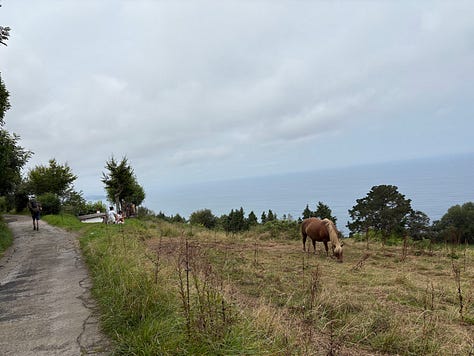
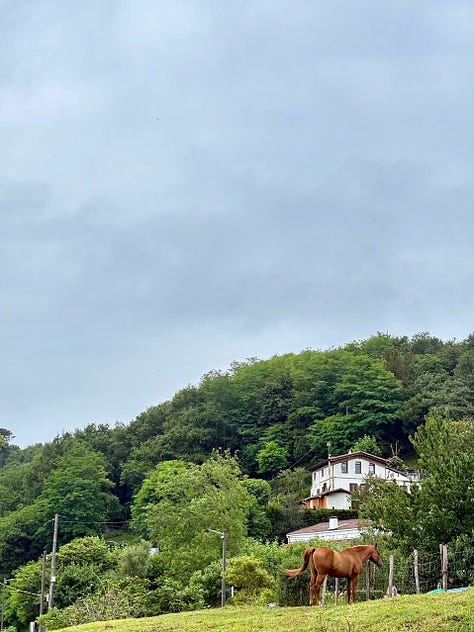



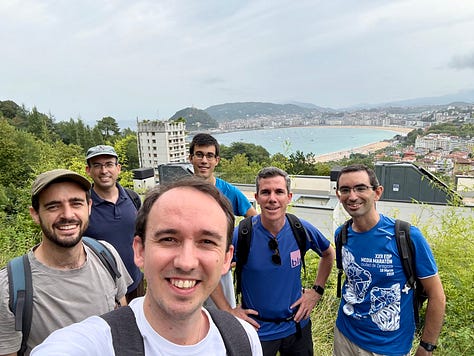
As I said at the beginning, for a week now I've been in my new city: Houston. As you can imagine, it's been a week of adaptation: I've never driven more in my life, the weather, the Americans haha I still have a long way to go to be a "true Texan" but I'm giving it my all. Much more to come, I'll keep telling you about it here. This is what my first week has been like.

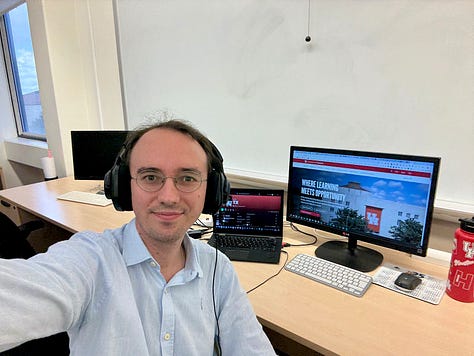
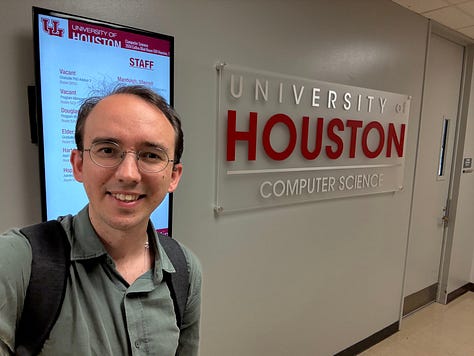
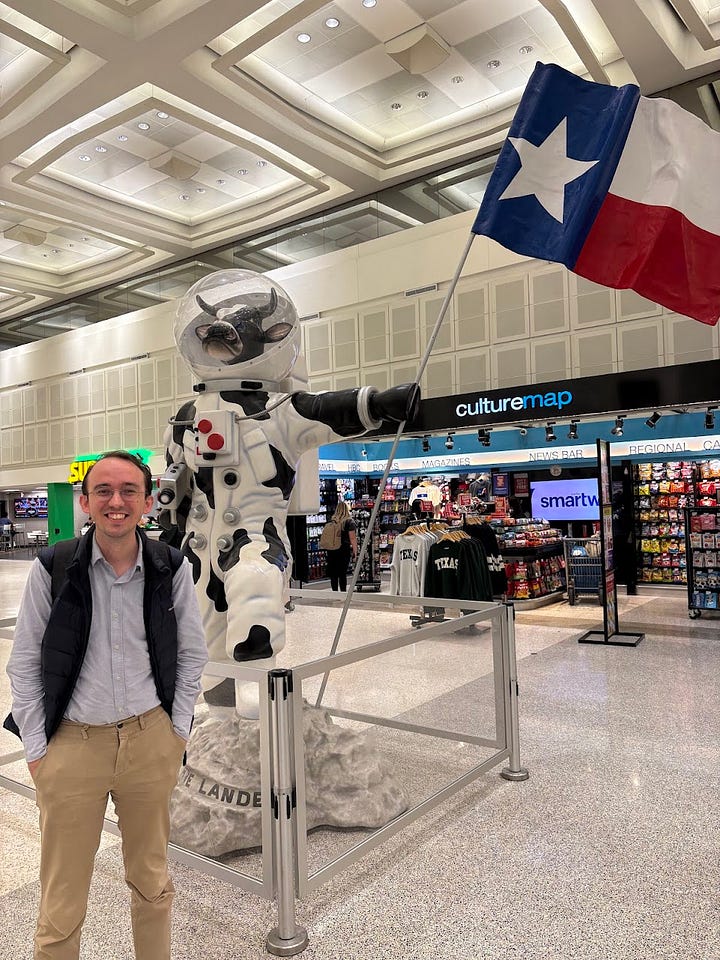

📖📺🍿 Currently Reading, Watching, Listening
I started watching Ed Sheeran's documentary, The Sum of It All, and it's brutal. Honestly, it doesn't feel like you're watching the life of a pop superstar; it's more like an approach to grief, to love, to the family of a normal person who had a shitty year.
BTW, I discovered this docuseries on A Good Movie to Watch, a site that selects titles with good reviews but low visibility, and tells you which platform they're available on. You can filter by mood, genre or streaming service. Ideal for when you want to watch something good without wasting time browsing through generic recommendations and misleading trailers.
That's all for this week. Thank you for your time. I value your feedback, as well as your suggestions for future editions. I look forward to hearing from you in the comments.
Quick Links 🔗
🎧 Listen to Computing Education Things Podcast
📖 Read my article on Vibe Coding Among CS Students
💌 Let's connect on LinkedIn or Instagram





